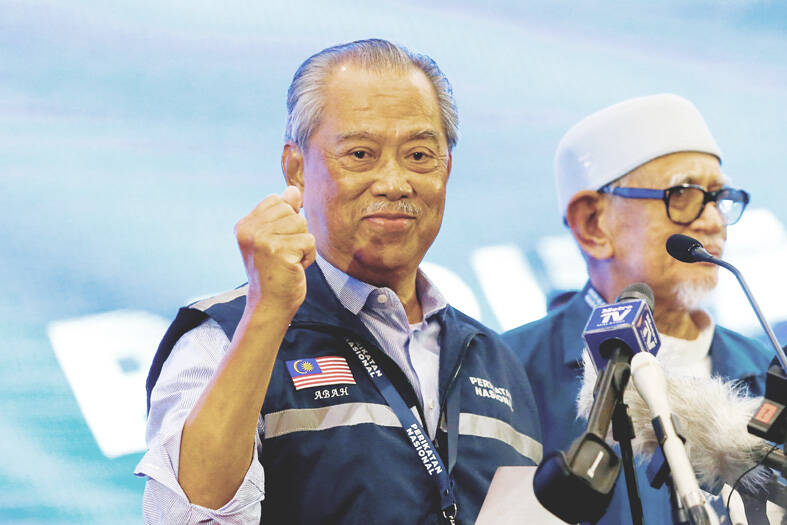Rival blocs yesterday claimed they had secured the support they needed to form a government after Malaysia’s hotly contested polls saw no party emerge with a clear majority of parliamentary seats.
Veteran opposition leader Anwar Ibrahim said his coalition had enough seats to form the country’s next government, which would allow him to become prime minister.
Former Malaysian prime minister Muhyiddin Yassin — who heads the rival Perikatan Nasional coalition — also said he was in talks to form the next administration after Saturday’s election.

Photo: Reuters
The stalemate comes in a country that has seen three governments in as many years.
In a bid to break the impasse, the palace yesterday asked the leaders of political parties to submit their preferred choice of coalition partners and for prime minister by 2pm today.
Home to 33 million people, Malaysia would need a ruling coalition with a strong mandate to tackle soaring food prices and an economy reeling from the COVID-19 pandemic.
While both leading political blocs claimed victory, neither offered details on the alliances they would make to form a government.
“We have now the majority to form a government,” Anwar said at a dawn news conference after hours of frenzied horse-trading negotiations through the night.
When pressed about who would enter into an alliance with him, Anwar did not give names, but said commitments had been made in writing and would be submitted to the king for endorsement.
At the end of vote-counting, Anwar’s Pakatan Harapan coalition won 82 seats and Perikatan Nasional grabbed 73, official results showed.
The once mighty Barisan Nasional — dominated by jailed former prime minister Najib Razak’s United Malays National Organisation (UMNO) party — trailed far behind the rest with only 30 seats, its worst performance since Malaysia won independence in 1957.
The graft-tainted bloc said it accepted the results and that it was a “big signal from the citizens towards us.”
The election also saw the rise of an Islamist party allied with Muhyiddin’s group. The Malaysian Islamic Party, or PAS, backs a hardline interpretation of Islamic law.
Ethnic Malay parties have campaigned on a platform that claims that members of Malaysia’s majority ethnicity would lose their rights if non-Malays — such as Anwar’s multiethnic bloc — are elected.
Oh Ei Sun of the Pacific Research Centre of Malaysia said that if Muhyiddin gets to form the government, the country is “likely to see a conservative theocratic coalition that will focus on religious and racial supremacy at the expense of effective economic management.”
“Perikatan Nasional’s strong message of clean government was able to make inroads into UMNO’s vote bank and captured key UMNO seats,” said Asrul Hadi Abdullah Sani, deputy managing director at BowerGroupAsia.
One of the highest profile losses in the election was former prime minister Mahathir Mohamad, 97, who was roundly defeated in his constituency.

The collapse of the Swiss Birch glacier serves as a chilling warning of the escalating dangers faced by communities worldwide living under the shadow of fragile ice, particularly in Asia, experts said. Footage of the collapse on Wednesday showed a huge cloud of ice and rubble hurtling down the mountainside into the hamlet of Blatten. Swiss Development Cooperation disaster risk reduction adviser Ali Neumann said that while the role of climate change in the case of Blatten “still needs to be investigated,” the wider impacts were clear on the cryosphere — the part of the world covered by frozen water. “Climate change and

Poland is set to hold a presidential runoff election today between two candidates offering starkly different visions for the country’s future. The winner would succeed Polish President Andrzej Duda, a conservative who is finishing his second and final term. The outcome would determine whether Poland embraces a nationalist populist trajectory or pivots more fully toward liberal, pro-European policies. An exit poll by Ipsos would be released when polls close today at 9pm local time, with a margin of error of plus or minus 2 percentage points. Final results are expected tomorrow. Whoever wins can be expected to either help or hinder the

DENIAL: Musk said that the ‘New York Times was lying their ass off,’ after it reported he used so much drugs that he developed bladder problems Elon Musk on Saturday denied a report that he used ketamine and other drugs extensively last year on the US presidential campaign trail. The New York Times on Friday reported that the billionaire adviser to US President Donald Trump used so much ketamine, a powerful anesthetic, that he developed bladder problems. The newspaper said the world’s richest person also took ecstasy and mushrooms, and traveled with a pill box last year, adding that it was not known whether Musk also took drugs while heading the so-called US Department of Government Efficiency (DOGE) after Trump took power in January. In a

It turns out that looming collision between our Milky Way and Andromeda galaxies might not happen after all. Astronomers on Monday said that the probability of the two spiral galaxies colliding is less than previously thought, with a 50-50 chance within the next 10 billion years. That is essentially a coin flip, but still better odds than previous estimates and farther out in time. “As it stands, proclamations of the impending demise of our galaxy seem greatly exaggerated,” the Finnish-led team wrote in a study appearing in Nature Astronomy. While good news for the Milky Way galaxy, the latest forecast might be moot